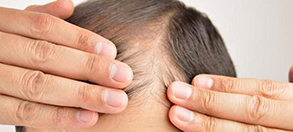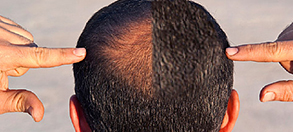Understanding the connection between menopause and female hair loss is important to address the root cause of the issue. While hair loss is commonly associated with male patients, it is common for women to experience hair loss at some point in their lives, especially during or after menopause. This hormone-related hair loss can result in a receding hairline and bald spots that affect your self-esteem.
Fortunately, hair transplants and non-surgical hair loss treatments can improve your hair density and hair growth for long-lasting and natural-looking results. These innovative treatments can do so without lengthy downtimes or visible surgical scars. Some non-surgical hair restoration treatments can also help mitigate hair loss among women.
At Houston Hair Transplant Center (HHTC), we have helped many patients improve their quality of life with innovative hair transplant and non-surgical hair loss treatments designed to help them achieve thicker, fuller hair.
Dr. Goran Jezic and his clinical team specialize in hair transplants and non-surgical hair restoration. They are well-known for their ability to help patients achieve long-lasting results. They take a holistic approach to hair loss; if you are experiencing hair loss as a result of an underlying hormonal imbalance, they will recommend that you see a hormone specialist, OB/GYN, or endocrinologist before you receive a hair transplant to address the underlying cause for optimal results.
Contact our Houston office or call (713) 864-2300 to learn how a simple, innovative hair loss therapy can transform your appearance!
About Menopause and Hair Loss
Menopause is a condition that occurs when a woman has not menstruated for 12 consecutive months. This process affects women’s hormonal levels, which can in turn affect:
- Hair growth and density
- Temperature regulation
- Energy levels
- Mood changes
- Weight fluctuations
- Sleep quality
Changes to your hormone levels can affect your hair growth cycles, resulting in hair loss. Thinning hair can be difficult to conceal, and hair loss near the crown and hairline can significantly affect your appearance and self-esteem. (2)
Female pattern hair loss (FPHL) is a condition that affects approximately 40% of women by age 30, and it is also common after menopause. (1) Hair loss can also affect the eyebrows, impacting the harmony of the facial features. Hair transplants and non-surgical hair restoration can address hair loss from a variety of different causes with minimally invasive techniques that help patients achieve stunning, impactful results.
Types of Menopause and Hair Loss Treatments
Follicular Unit Extraction (FUE)
Follicular unit extraction (FUE), also known as Follicular Unit Excision, is a hair transplant procedure that improves the appearance of thinning hair by taking healthy hair follicles from the back of the scalp and placing them in the area where you are experiencing hair loss. Unlike conventional procedures, such as Follicular Unit Transplantation (FUT), which requires linear surgical scars, more discomfort, and a longer recovery period, FUE is minimally invasive. We can strategically address the areas where you are experiencing hair loss, and we can address multiple areas of the body during a single appointment. We offer many different types of hair loss treatments and hair restoration procedures to help you achieve your aesthetic goals:
- ATERA FUE: ATERA is an automated harvesting system, based on suction technology, that is used to aid in the extraction of hair grafts from the donor area.
- NeoGraft: We can extract hair grafts individually with this semi-automated device.
- Hybrid Hair Restoration: We can combine surgical and non-surgical procedures during a single session to achieve a higher density.
We can also perform a mega-session FUE procedure to transfer a larger number of hair follicles, up to 5,000 grafts, during a single session. This approach is ideal for patients who are experiencing a significant amount of hair loss and/or would like to address hair loss in multiple areas.
Topical Treatments
Topical scalp treatments can stimulate new growth and help you achieve natural-looking results. For example, Minoxidil (Rogaine) improves circulation to help you achieve thicker hair. We can incorporate topical treatments into hair transplant plans to optimize your results.
Injections. Likewise, our topical compound that is especially designed for women consists of a combination of finasteride, minoxidil, biotin, caffeine, and peptides to help preserve and regrow hair.
Injectable hair loss treatments harness the power of your own blood to address hair loss by helping your scalp generate new cells. The nutrient-rich serum increases the growth factors in your scalp and stimulates the follicles for long-lasting hair growth. (3) The formula can also increase your skin’s fibroblasts to reduce inflammation and help your skin produce more collagen and elastin, which contribute to scalp and follicle health. (4,5)
To learn more about our hair loss treatments, see the blog!
Benefits
There are several benefits of hair loss treatments, which include:
- Minor surgical options: We can extract healthy hair follicles with advanced suction technology, eliminating the need for linear incisions.
- Lasting results: If you take good care of your scalp, you can enjoy lasting hair growth.
- Natural-looking hair growth: You can enjoy natural-looking results and the appearance of denser, fuller hair.
- Comfortable treatments: We can transform the appearance of your hair density with well-tolerated treatments that often incorporate anesthesia with sedation.
- Minimal downtime: After FUE, patients can often return to most of their normal activities within a few days.
- Customizable hair restoration: We can personalize your treatment plan and combine a hair transplant with non-surgical treatments to help you achieve your aesthetic goals.
Candidates
Suitable candidates for hair loss treatments would like to address thinning hair and/or bald spots. They would also like to address general hair loss that may be caused by menopause and achieve natural-looking results. If you have realistic expectations about what you can achieve with the treatments we offer, you are likely a good candidate for hair loss, hair transplant, and hair restoration treatments!
Personal Consultation
During your consultation, we can discuss the most effective treatment plan for your needs. Dr. Jezic and our clinicians will examine your medical history and inquire about your hair routines. We will also ask about lifestyle factors and medications. If you regularly wear tight hairstyles that pull on your hair, we recommend that you wear looser styles. We will likely recommend that you follow up with your primary care doctor, endocrinologist, or OB/GYN to find out if menopause is contributing to your hair loss. They may be able to recommend therapies that can help you balance your hormones and mitigate future hair loss.
You can schedule your consultation online, or you can call our Houston office at (713) 864-2300. We also offer virtual consultations for your convenience.
Preparation
To prepare for a hair transplant, you may need to reduce or stop taking blood-thinning medications and supplements, as advised by your doctor, 1-2 weeks before and after your treatments. You will also need to refrain from smoking for several days or weeks. We also recommend that you stop drinking 24-72 hours before your treatment for optimal results and get a good night’s sleep the night/s before your procedure. Don’t forget to eat a light breakfast on the morning of your procedure.
After Hair Loss Treatments
After a hair transplant or non-surgical hair restoration procedures, you can enjoy fuller, thicker hair growth and long-lasting results. We strategically adjust your treatment plan to address areas where you are experiencing thinning hair and/or bald patches to help you achieve natural-looking results.
Cost of Hair Loss Treatments in Houston
The cost of a female hair transplant will depend on the type of procedure or treatment you undergo and whether you need additional sessions to achieve your goals. We can provide an all-inclusive quote during your consultation.
Schedule your consultation today, or call our Houston office at (713) 864-2300 to learn more!
FAQ
Can hair loss caused by menopause be cured?
Hair loss can result from several different factors, and we can discuss the most effective treatment plan for your needs during your consultation. If you suspect menopause is causing your hair loss, it can be helpful to consult with a hormone specialist to assess your current levels.
Are hair restoration treatments for hair loss permanent?
Although hair loss treatments are long-lasting, we will need to examine your scalp and discuss your symptoms to determine how to address your chronic hair loss. We can answer any questions you have during your consultation.
Will I have scarring after a hair transplant?
Thanks to modern advancements, hair transplants do not result in overtly visible scarring. The hair transplant procedure harvests the grafts individually, as opposed to the linear incision method that was used for traditional hair transplants.
How many hair transplant procedures will I need?
This depends on the state of your hair loss. We can discuss the most effective hair transplant surgery or non-surgical hair restoration treatments for your goals during your consultation. However, most patients enjoy a significant improvement after just a single treatment.
References
- Famenini S, Slaught C, Duan L, Goh C. Demographics of women with female pattern hair loss and the effectiveness of spironolactone therapy. Journal of the American Academy of Dermatology. 2015;73(4):705-706. doi:https://doi.org/10.1016/j.jaad.2015.06.063
- Kische, Hanna, et al. “Sex Hormones and Hair Loss in Men from the General Population of Northeastern Germany.” JAMA Dermatology, vol. 153, no. 9, 1 Sept. 2017, p. 935, https://doi.org/10.1001/jamadermatol.2017.0297. Accessed 29 Mar. 2020.
- Lin W, Xiang LJ, Shi HX, et al. Fibroblast Growth Factors Stimulate Hair Growth throughβ-Catenin and Shh Expression in C57BL/6 Mice. BioMed Research International. 2015;2015:1-9. doi:https://doi.org/10.1155/2015/730139
- Cheng M, Ma C, Chen HD, Wu Y, Xu XG. The Roles of Exosomes in Regulating Hair Follicle Growth. Clinical, Cosmetic and Investigational Dermatology. 2024;17:1603-1612. doi:https://doi.org/10.2147/CCID.S465963
- Gupta AK, Wang T, Rapaport JA. Systematic review of exosome treatment in hair restoration: Preliminary evidence, safety, and future directions. Journal of Cosmetic Dermatology. 2023;22(9):2424-2433. doi:https://doi.org/10.1111/jocd.15869



